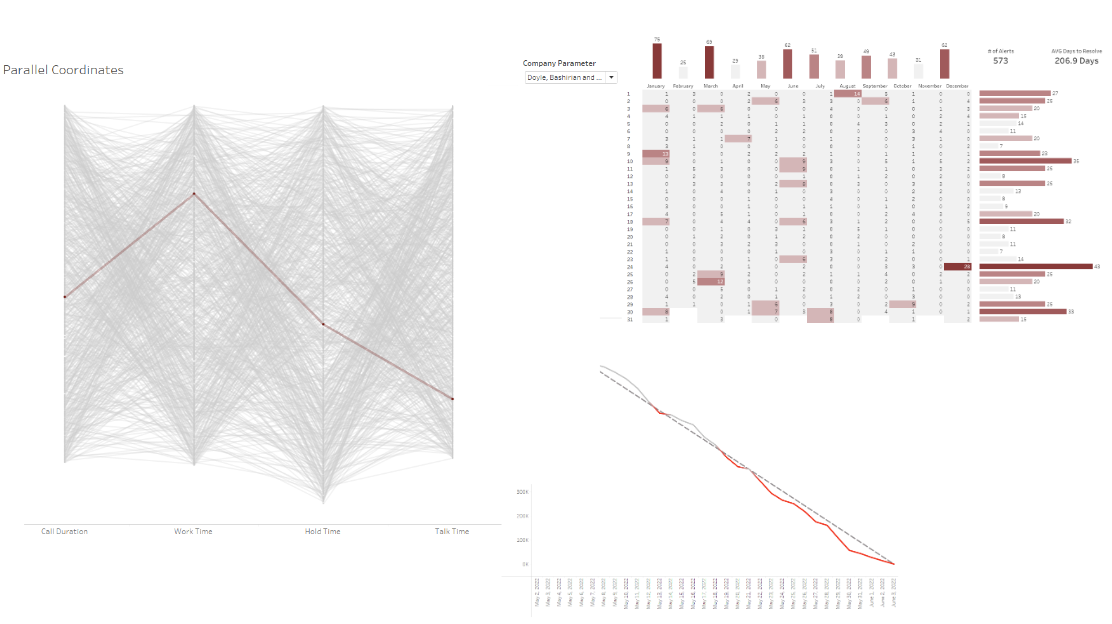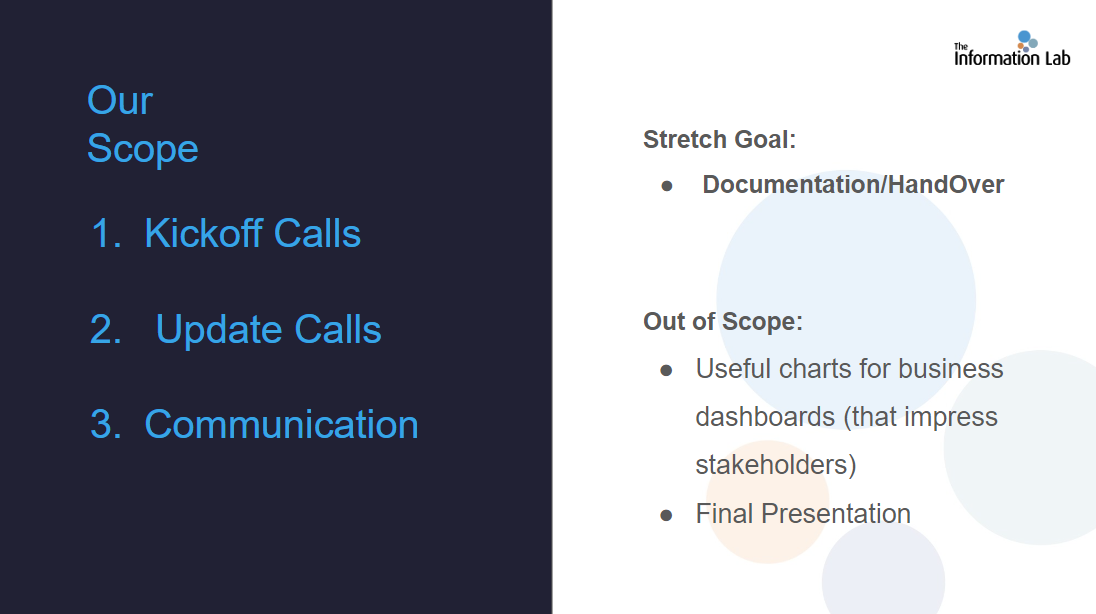A few weeks after finishing our intensive on-the-job training to become data consultants, I had the incredible opportunity to be back in the classroom - but this time as the teacher! Over the span of a full week, I taught 2 x 3h sessions on general consultancy skills and building more advanced business charts in Tableau, including Marginal Histograms, Parallel Coordinates Charts, and Burndown Charts.

It has been an amazing experience and I genuinely enjoyed the opportunity to become a better teacher, learn from the experience of the data consultant trainees that I taught, and challenge myself to not only give a lecture, but to make it as interactive and real-world applicable as possible.
Would I do it again?
Within the blink of an eye!
Teaching consultancy and Tableau is one of the most fun things I have ever taught and I can't wait for more Tableau/Alteryx Teaching in my future.
Here are some of my Lessons Learned and Takeaways:
1. Assume the Best
Sometimes it is so easy to jump to unjust conclusions. For example, someone is on their phone during your teaching session and you think they are bored. Or someone is doodling in their notes and you think they are not listening. Maybe someone is sighing at a part when you felt insecure about the content. Or someone is late.
It is so easy to interpret these behaviors as personal and become defensive: "They are disrespectful, they are doing it because they don't like me" and so on and so on. Our brain is so good at telling us all these horrible stories about ourselves and others.
But we can re-program our thoughts too!
The next time you catch yourself thinking those "worst case" scenarios, reframe your thoughts. Here are some examples:
- Someone is on their phone while you teach. "Maybe that person has a family emergency and is checking in with their husband/children/parents/significant other/best friend etc."
- Someone is doodling in their notes. "Maybe having something to do with their hands actually makes them listen more to me" (hint: this is actually something that I can emphasize a lot with - I can concentrate best when my hands have something to do).
- Someone is sighing at something you say. "Maybe they had a very hard and fast-paced week and for the first time they are able to breathe deeply".
- Someone joins late. "Maybe they had an important conversation about their career that in this moment took precedence over being on time for your teaching session".
Most of the time, behaviors like these have nothing to do with you but have other reasons. So why not assume the best?
2. Be flexible
Some things will go wrong. For example, the technology is not working, your whiteboard marker runs out of color, or your laptop restarts in the middle of your presentation. Have you ever seen amazing presenters or teachers? Whenever something goes wrong they just handle it with grace, change up what they had planned, or simply laugh about it and move it.
In my recent teaching session, I had planned to do a quiz where people login with their phones, choose an answer and I can show the distribution of answers on the screen. But for some reason, the technology didn't want to cooperate. I quickly decided to change plans and not waste time and simply do a quick show-of-hands. I presented the options to the group. But the problem was that there were too many options that by the end people had already forgotten the first few options. I then decided to write the options on a Whiteboard. But then it turned out that the options were ambiguous to begin with. The whole part didn't go as planned, but that was okay. I learned and everyone else learned too. Through some detours we finally got to the point that I tried to make with the quiz. Laugh it off and move on!
3. Have contingency plans
I am a planner by heart and will have my teaching lesson planned out. Slides, topics, Tableau starter and solution workbooks etc. But what is even more important is to have contingency plans.
Because even with the best plans, some things will NOT go according to plan. Maybe you move faster than you thought you would. Or it goes slower. In either case, have a plan what you will do.
For me, this meant to scope my own teaching session. I asked the trainees what they would prioritize and what we could make a stretch goal. But even within the prioritized sections, I knew which slides I could skip if time would get too tight.
On the other hand, I also had more material prepared than I needed in case we had time left over at the end.

4. Relax - you will make mistakes!
One lesson I really had to learn was to simply relax. You will make mistakes and some things won't go to plan. For example, you may misunderstand a questions. Or you will run out of time. Maybe you will spell a word wrong on the whiteboard and everyone will laugh.
Mistakes are part of it and sometimes even lighten the mood and contribute to a more comfortable and easy learning environment. A teacher or coach is not the almighty person who has all the answers, but who can support you to find the answers.
5. Don't be afraid to say you don't know
One of the biggest hurdles for me when I started teaching was "But what if I don't know the answer?". As a result I would overprepare, be nervous and anxious before public speaking or teaching opportunities. But so what? There will always be scenarios where you don't know the answer, but you may know who does. So you can be confident in saying that you want to provide the most accurate answer and that you will refer to someone who you know knows the answer for sure.
If you are teaching a group, you can also ask the others if they have experience with that particular problem/question and whether they know the answer. That way you can immediately learn from them.
You also don't have to answer right away, but you can also get back to people. Thank them for their excellent and smart question and tell them that you will find the answer for them and then get back to them (only caveat here: you actually have to get back to them - don't say it and then never get back to them with the right answer).
One good skill of a teacher or coach is lifelong learning. You may not know the answer, but you are always willing to learn, even if that means learning from your students or trainees or asking someone else who does know.
6. Be comfortable with silence
One thing that I had to get used to when I first started out teaching was to become comfortable with silence. Sometimes you ask a question such as "Are there any questions?" or "Did you get that?" and you just receive silence back. This is even amplified in online/virtual teaching compared to in-person, because in the "worst case" scenario all people have their cameras turned off and you just have to wait a few seconds in silence without having the feedback of body language or facial expressions.
At the beginning, this really threw me off and made me insecure. After a while, I started to communicate that silence is always a sign for me that everything is on track, no one has questions, and we can move on. Silence means "yes". If that is not the case, people have the opportunity to speak up (or use the chat if we are virtual). Of course this is a balance, because sometimes people are not comfortable speaking up if they feel like they are the only people in the room not knowing or understanding something. So the skill here is to differentiate the type of silence. Is everyone silent because they don't have questions? Or are they silent because they didn't understand? Either way, as the teacher you will have to become comfortable in that silence, learn to interpret the silence, and then adjust accordingly.
Were these lessons helpful? If you like teaching as much as I do, follow me on LinkedIn, connect with and tell me what drew you to teaching - I would love to hear from you.
Feature image by Jason Goodman / Unsplash
Screenshot of slides created by Lisa Hitch/The Information Lab
